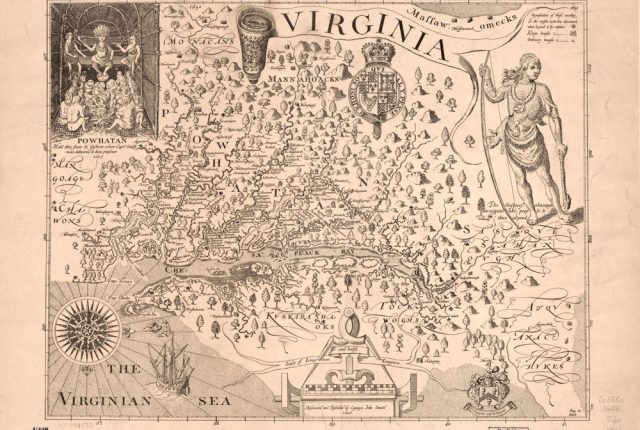
Date/Time
Saturday, October 26, 2019
10:00 am – 12:45 pm
Location
William Andrews Clark Memorial Library
2520 Cimarron Street
—organized by Brenda E. Stevenson (University of California, Los Angeles) and Sharla M. Fett (Occidental College)
The year 1619 was designated as the red-letter year in Virginia, the first permanent colony in British North America, for three reasons—it marked the beginning of a representative government; the arrival of captive African laborers; and the initiation of a successful plan to encourage permanent family development through the importation of English women. It was on June 29, 1619, that Sir George Yeardley, governor general of the colony, convened a legislative assembly consisting of persons sent as representatives by its free male residents. It was the first such legislative assembly in the British colonial New World. Two months later, the first shipment of Africans arrived at Point Comfort on the southern coast of Virginia, a foreshadowing of the hundreds of thousands of African laborers who would eventually arrive and help to transform Virginia, and several other colonies, into race-based-slave economies. That same year, the Virginia Company of London began a concerted effort to recruit “respectable [English] women” to the colony so that, in the words of one Company officer, they could “‘make wifes to the inhabitants and by that meanes to make the men there more settled and less moveable.” The combination of these efforts, all meant to enhance the lives of the colonial male elite, marked the beginning of a true settler colony for Britain in North America. This beginning came with grim implications for the indigenous populations the British encountered. These experiments in governance, settler colonialism, and a racialized economy also proved to be the characteristic underpinnings of our independent nation two hundred and fifty years later. 1619 was indeed the red-letter year of British America’s 17th century!
The 2019–20 core program, which marks the 400th anniversary of this notable year, encompasses three conferences, each of which will address one of the three seminal events of 1619 within the geopolitical, economic, and social/cultural contexts of 17th and 18th century North America. Across these conferences, we will also consider 1619’s impact on the nation’s eventual character. The British, of course, were not the first Europeans to explore, establish permanent settlements, import African slaves, or create governing structures in North America. The French and the Spanish made several forays into the southern, gulf, and western regions before the British. Therefore, the program will also encompass French and Spanish forays into the southern, gulf, and western regions.
The inaugural conference, “’20. And odd Negroes’: African Labor, Colonial Economies, Cultural Pluralities,” references the 1619 forced migration of Africans to colonial Virginia. Scholars will discuss the arrival, distribution and resistance of African laborers among British settlers and those of other European colonies in North America; the creation of slave-based (African and indigenous) and slave trade influenced colonial economies; and the evolving legal and social implications of the growing cultural diversity of the colonial population. Collectively, presentations encourage a discourse about Europeans of varied religious and linguistic backgrounds, diverse indigenous peoples, and multiple African ethnicities.
Speakers
Catherine M. Cameron, University of Colorado, Boulder
David Eltis, Emory University and University of British Columbia
Ayana Omilade Flewellen, University of California, Berkeley
Mark G. Hanna, University of California, San Diego
Gregory E. O’Malley, University of California, Santa Cruz
Brett Rushforth, University of Oregon
Brenda E. Stevenson, University of California, Los Angeles
Andrew Kettler, Ahmanson-Getty Postdoctoral Fellow
Program
10:00 a.m.
Morning Coffee and Registration
10:30 a.m.
Panel 3: Cultural Pluralities: Indigenous/Colonial Interactions
Chair: Kevin Terraciano, University of California, Los Angeles
Catherine M. Cameron, University of Colorado, Boulder
“North American Slavery in 1619: A Continental Perspective”
11:00 a.m.
Ayana Omilade Flewellen, University of California, Berkeley
“The Materiality of 17th Century African Diasporic Life in the Americas”
11:30 a.m.
Coffee Break
11:45 a.m.
Andrew Kettler, Ahmanson-Getty Postdoctoral Fellow
“The Smell of Slavery: Olfactory Racism and the Atlantic World”
12:15 p.m.
Discussion
12:45 p.m.
Program concludes
There is no charge for this event. Advance booking is requested.
Booking Form
Bookings are currently closed for this event.

